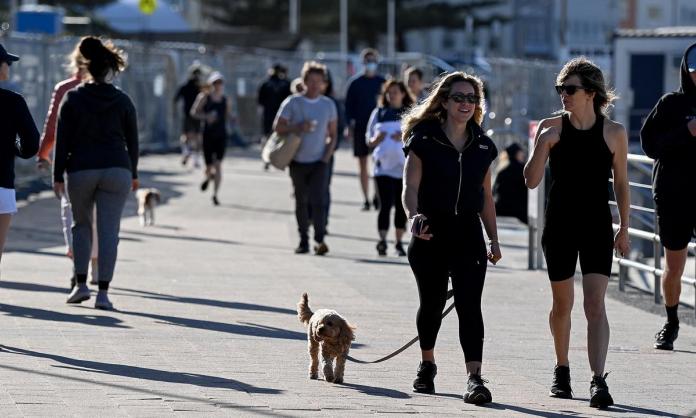Proper lockdowns crush COVID. Even Prime Minister Scott Morrison now acknowledges that. But lockdowns raise important class questions. Governments are willing to throw billions of dollars at business affected by lockdowns, with few strings attached, but drag their feet before announcing measures to help the working class.
Action is needed on several fronts. First, we know that lockdowns are effective only if workers are paid properly to stay at home during an outbreak. Without financial support, workers whose workplaces have been shut down will be driven by poverty to try to find work, no matter the risk of catching and spreading COVID.
We also know that financial insecurity is making some workers reluctant to get tested for the virus, which too often means that by the time health authorities track them down, they have unwittingly infected other members of their household, resulting in even further spread of the virus. If they are essential workers, they need to get paid time off to be tested and to isolate while awaiting the result. If infected, they should of course receive full government support while off work.
With Sydney now in an extended lockdown, the federal government has responded the same way it did last year: bosses looked after first, and many workers given the bare minimum. After initially offering peanuts to workers as Sydney case numbers began rising, the federal government was forced to loosen the purse strings, introducing a $750 per week disaster relief payment for full-time workers affected by the lockdown. The government initially excluded people receiving Centrelink entitlements but, again, it was forced to allow welfare recipients to claim disaster relief payments, albeit capped at $200 per week.
The Morrison government has been pushed to provide this financial assistance to workers. But let’s be clear: the money is still pitiful. $750 a week is not a living wage; it’s less than the minimum wage of $773 and less than half the average weekly earnings of $1,562. Already there are media reports of a surge in demand for charity food parcels from financially strapped households, with 10,000 on the waiting list for Foodbank Australia.
The NSW and federal governments are paying subsidies to NSW businesses of up to $100,000 per week, on the condition that bosses don’t sack people. But who can be confident that this will be monitored and enforced in the absence of strong unions? And there is nothing to stop employers simply sacking workers when the lockdown eventually lifts.
The federal government must institute a pandemic pay scheme that ensures workers do not suffer financial hardship when lockdowns are introduced or when they need to take time off for testing or isolating. In addition, the JobSeeker payment for the single unemployed should be set at the minimum wage, and rates for those with children increased further. Financial assistance should be offered to all, including casual workers and those who are not permanent residents or citizens but hold temporary visas, including international students and refugees. And childcare for the children of essential workers should again be free.
Class is central to other experiences of lockdown. Governments regard the bosses’ profits as sacrosanct, which explains why so many non-essential Sydney businesses are still trading during the Berejiklian government’s half-arsed lockdown. These include Officeworks, Bunnings, plant nurseries, newsagents and the Myer department store in central Sydney. Doctors are exempted from lockdown, as they should be, but they are left to decide what operations are essential. So, for example, some medical clinics across Sydney are still offering Botox, fillers and liposuction procedures. These businesses need to be shut and their workers given financial support.
Proper financial support would also undercut the campaign, run by some unions that have teamed with the bosses, to demand wider exemptions for “their” industries. From the moment that the Berejiklian government ordered construction companies to suspend operations for two weeks in mid-July, the construction union joined the bosses in lobbying for the industry to be reopened. There is no health rationale for this, it was purely to protect the bosses’ bottom line so they could get back to throwing up shopping malls, hotels and private apartment blocks.
The bosses got their way: on 28 July, the state government announced that construction could reopen outside the eight local government hotspots. Even then, the construction union wasn’t happy. The NSW state secretary wrote on Facebook: “We are pushing hard to broaden the opening up of the industry”. That would put workers’ lives at risk: not just at work but during travel to and from work. And not just construction workers, but other workers with whom they come into contact.
The construction union was not the only culprit: the transport workers’ and maritime unions have also fought alongside the bosses to exempt “their” industries from lockdown. In each case, the union leaders argue that members’ financial needs can be safeguarded only by allowing the bosses to operate. They should be demanding comprehensive financial support from the government and supporting the lockdown.
Then there are essential businesses that operate in a way that exposes the workforce to COVID. Key measures for essential workplaces include: capacity limits to ensure social distancing is feasible; workplace bubbles and split shifts to minimise cross-infection between different groups of workers; the provision of full PPE in high-risk workplaces such as meatworks and cold storage distribution; servicing of air-conditioning units to reduce the risk of aerosol transmission; deployment of worksite rapid antigen testing of workers before they clock on for each shift; and worksite vaccinations. Mask-wearing indoors and outdoors must be made mandatory across the city, not just in the hotspots: the Burnet Institute estimates that the mask mandate during Victoria’s second wave significantly reduced spread of the virus.
Supermarkets are another example of an essential industry in which workers’ health is jeopardised. Coles and Woolworths bosses don’t care much about public health, they just want customers to spend in their stores. Supermarket managers in Sydney make little effort to ensure customers scan the QR code or wear masks. The result is that customers, quite possibly asymptomatic COVID cases, are interacting with retail workers and endangering them.
The retail union has won NSW government support for priority access to the Pfizer vaccine for workers in supermarkets, but that’s not good enough. Customers should not be allowed inside. Supermarkets need to operate on a click and collect basis or home delivery to minimise risk of infection. Supermarket staff no longer working in store should be redeployed to work in warehouses packaging orders for delivery or in transporting goods to customers. Those unable to carry out such work for health reasons should remain home on full pay. And if the likes of Bunnings are to remain open, such stores should at least be expected to operate on the same basis as supermarkets need to: click and collect or home delivery with all staff retained on full pay.
There should also be proper monitoring of workplaces that remain open. On 29 July, the NSW government empowered police to close businesses operating unsafely. But there is no reason that this job cannot be done by fully funded and staffed health departments. Businesses should be ordered to close on the same basis as occurs, or should occur, during all serious infringements of workplace health and safety.
The NSW government has consistently sent the wrong message from the outset, delaying implementation of the lockdown, only slowly increasing restrictions, issuing invocations and pleas rather than clear edicts, and now, with daily case numbers continuing to rise, considering relaxing lockdown provisions. Already, construction has been given the green light to reopen, as have schools, to year twelve students, risking the lives of students and teachers. Schools should remain closed to all but the children of essential workers until case numbers start to come down significantly.
Failure to carry out such protective measures will likely extend the current wave of infections in NSW. This in turn will give the hard right in the government and the Murdoch media the confidence to argue that the lockdown is not working and so should be scrapped altogether, something that would have devastating effects.
It’s not like the money isn’t there to pay for these things. Business profits in the year to March were up by 11 percent. The stock market is at an all-time high. And the billionaire class is rolling in it. When it released its annual Rich List in May, the Australian Financial Review declared: “Australia’s billionaires have thrived during the pandemic year ... they have shrugged off the pandemic to be richer than ever before”. The Morrison government is happy to throw money at these people, cutting their taxes and handing out government contracts to well-connected businessmen and women. But workers get only crumbs.
The pandemic has demonstrated who are the real essential workers in our society— not the rich, but workers like those in south-western Sydney now subjected to the threat of covid and poverty. This must end now. The federal and NSW governments must tax the bosses to pay for financial assistance to those workers who have lost money, must enforce a proper lockdown and must ensure that those required to work can do so safely.









